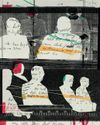
On August 7, 1829, Felix Mendelssohn took a steamer from the Scottish mainland to the grandly rugged island of Mull, in the Inner Hebrides. Later that day, the composer wrote to his sister Fanny, "To illustrate how strangely the Hebrides affected me, the following just occurred to me there." He then set down twenty-one bars of music in B minor, with indications for orchestration: a downward eddying theme in the violas and cellos, silvery chords in the violins and winds. From that sketch emerged the "Hebrides" Overture, which is sometimes called "Fingal's Cave," although Mendelssohn didn't see that landmark until the next day.
I listened to "The Hebrides" countless times when I was a kid, its surging lines and sea-spray climaxes conjuring Turneresque pictures in my mind. When, in September, I visited Mull for the first time, the island lived up to its musical archetype, looming out of the mist like a mass of gray shrouds thrown onto the ocean. Appropriately, I was on my way to see a chamber music series called Mendelssohn on Mull, which has been running since 1988. It was founded by the London-born violinist Leonard Friedman, who wished to lead master classes in an atmosphere free of urban pressures. In recent years, Mendelssohn on Mull has had a quartet in residence, which gives concerts while providing guidance to younger musicians. This year, the Maxwell Quartet, a mostly Scottish ensemble, took over from the Doric Quartet.
It's not a Mendelssohn festival.
Only three of the composer's pieces appeared in the programs, amid works by Haydn, Mozart, Beethoven, Dvořák, and Glazunov. Listeners were left to decide for themselves how this largely Central European repertory related to the edge-of-the-world terrain around them. Certainly, the chamber-music classics are suited to the intimacy of the island's venues-small churches and village halls-and to the informal conviviality of the audience.
This story is from the October 07, 2024 edition of The New Yorker.
Start your 7-day Magzter GOLD free trial to access thousands of curated premium stories, and 9,000+ magazines and newspapers.
Already a subscriber ? Sign In
This story is from the October 07, 2024 edition of The New Yorker.
Start your 7-day Magzter GOLD free trial to access thousands of curated premium stories, and 9,000+ magazines and newspapers.
Already a subscriber? Sign In

GET IT TOGETHER
In the beginning was the mob, and the mob was bad. In Gibbon’s 1776 “Decline and Fall of the Roman Empire,” the Roman mob makes regular appearances, usually at the instigation of a demagogue, loudly demanding to be placated with free food and entertainment (“bread and circuses”), and, though they don’t get to rule, they sometimes get to choose who will.

GAINING CONTROL
The frenemies who fought to bring contraception to this country.

REBELS WITH A CAUSE
In the new FX/Hulu series “Say Nothing,” life as an armed revolutionary during the Troubles has—at least at first—an air of glamour.

AGAINST THE CURRENT
\"Give Me Carmelita Tropicana!,\" at Soho Rep, and \"Gatz,\" at the Public.

METAMORPHOSIS
The director Marielle Heller explores the feral side of child rearing.

THE BIG SPIN
A district attorney's office investigates how its prosecutors picked death-penalty juries.

THIS ELECTION JUST PROVES WHAT I ALREADY BELIEVED
I hate to say I told you so, but here we are. Kamala Harris’s loss will go down in history as a catastrophe that could have easily been avoided if more people had thought whatever I happen to think.

HOLD YOUR TONGUE
Can the world's most populous country protect its languages?

A LONG WAY HOME
Ordinarily, I hate staying at someone's house, but when Hugh and I visited his friend Mary in Maine we had no other choice.

YULE RULES
“Christmas Eve in Miller’s Point.”